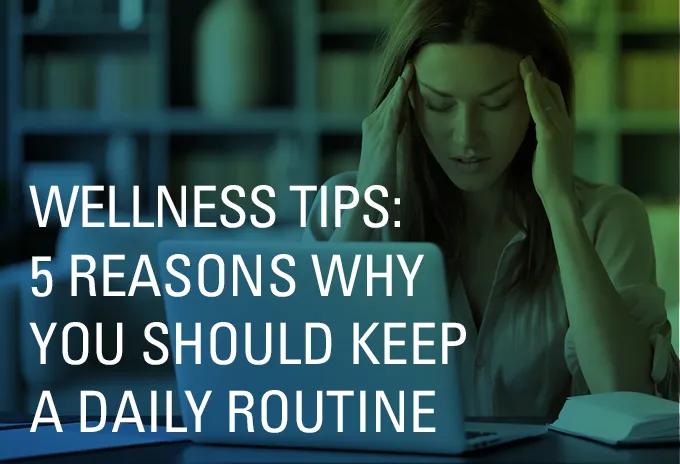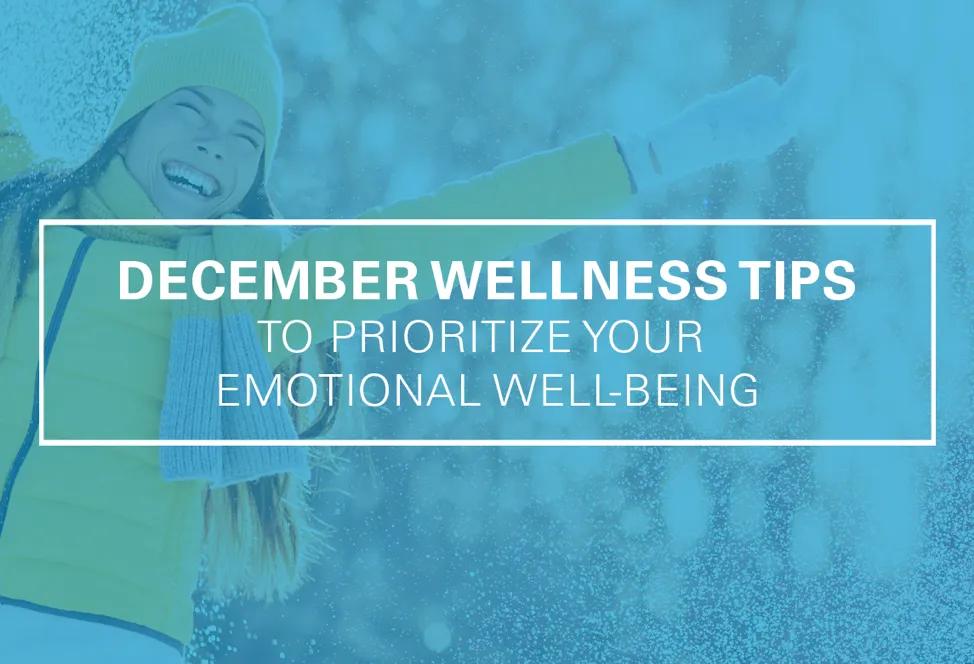Wellness Tips: 5 Reasons Why You Should Keep a Daily Routine

Did you know that sticking to a routine can be beneficial for your health? If you’re balancing school with other obligations such as work and childcare, you’re probably looking for more ways to reduce your stress level.
During stressful times, people may let their daily routines lapse and forego many of their important day-to-day activities. But routines can actually help maintain balance between our responsibilities and schoolwork and can help create a sense of peace in our environments.
Here are five reasons you should keep a routine and why it’s important:
Reduce Stress and Anxiety
Repetitive tasks, such as daily hygiene activities, can reduce stress as you do not have to put much thought into them. Things like brushing your teeth, washing your hair, or even a skincare routine can allow your brain to go on autopilot and promote free thought. You may find yourself remembering random things while doing these tasks, or even thinking of new ideas. Repetitive tasks are a healthy way for your subconscious to relax and explore free thought. Think about some repetitive tasks you can add to your day to day.
Increase Productivity
If you find that you are unable to maintain your daily routine, chances are you have new responsibilities hindering you from doing so. People might think skipping a few of their usual daily tasks is the way to create more time for new tasks. However, shirking usual responsibilities can create more work in the long haul. Those tasks will always be there and may end up being more difficult to complete since they have been neglected. Instead, try shortening the time spent on your usual responsibilities to create more time for new tasks.
Feel More in Control
Many aspects of life seem out of our control, but your routine can help you feel more like you have a hold on things. You may not be able to influence how much schoolwork you get in a week, or how many hours you work, but you can regulate what you do in a day. If you’re unhappy with something, try changing it or incorporating it within your routine. If you dislike having to do coursework when you return from work, try doing it in the morning so you have time to relax in the evenings. If you don’t get excited about waking up and making lunches for the kids, try packing as much as you can the night before to create less to do in the morning. It can be hard when family and life needs are unpredictable, but you can take charge of your life by creating routines.
Build Time Management
Once you form a routine, you’ll be following specific activities throughout your day — from morning to evening, at work or at school. Seems obvious, right? What’s not as apparent is as you’re doing this you are in fact creating daily habits. This means that those activities that you may have dreaded before are now more predictable. This allows you to properly allocate time to each responsibility and could offer more flexibility as a result in case something unexpected pops up. When you find yourself planning for and around your routine, you might find that can more easily accomplish your goals.
Discover Yourself
Trial and error, right? As you develop your routine and try things out, you’ll inevitably figure out what does and doesn’t work for you. This is good! We can’t expect a new routine to work perfectly the first time. It’s a work-in-progress. Life constantly changes and when you figure out what process works best for you, adapting to those changes may be less stressful than they were before.
Helpful Resources
- Tips for a Healthier Lifestyle
- The Importance of Maintaining Structure and Routine During Stressful Times
- Why routines are good for your health
Remember, your daily routine matters. You might not think you have one now, but it’s worth sitting down and reviewing your daily activities. What’s something you do every day? It doesn’t matter if it’s as simple as flossing every night. That counts!
Think about your current routine. There are likely things you’d like to do more of and a few habits you’d like to leave behind. When you take the time to review how you spend your time, you can fine-tune your own routine to begin living a more stress-free life. In time, you’ll be able to focus on the things that matter — your goals.
UMA Support
UMA knows that many students juggle work and family life while going to school. That’s why we have a built-in support system. Our Learner Services Advisors are here for you. Call 888-216-0544. We encourage you to reach out with questions and concerns.
UMA Cares
UMA Cares handles important student issues that may need to be addressed with special attention. UMA Cares takes all inquiries seriously and responds in a timely manner. Our mission is to provide a simple way for students to get answers for unresolved issues concerning their student experience. Visit UltimateMedical.edu/uma-cares/ to make your voice heard.
UMA does not endorse any vendors, products, or services presented in the UMA Wellness Blog Series, and UMA bears no responsibility in any capacity as it relates to such vendors, products, or services. The information on wellness or related services is not intended or implied to be a substitute for professional financial advice. Please contact the vendor or service provider for answers to questions regarding its content, products, or services.
Request Information
Talk with us. Start your journey.
Complete this form and we'll call you to explore options at UMA and answer your questions. We'll also email you info on how to get started. We're with you at every step!
Request Information
Talk with us. Start your journey.
Complete this form and we'll call you to explore options at UMA and answer your questions. We'll also email you info on how to get started. We're with you at every step!
About the Author
 Adam Fenster
Adam FensterAdam Fenster is a senior copywriter at Ultimate Medical Academy, with journalism experience from his time as a reporter and editor for multiple online and print publications. Adam has been covering healthcare education since 2019, with an emphasis on topics such as wellness, healthcare employment, and job preparedness. He received his BA in journalism from the University of South Florida.
Related Content


